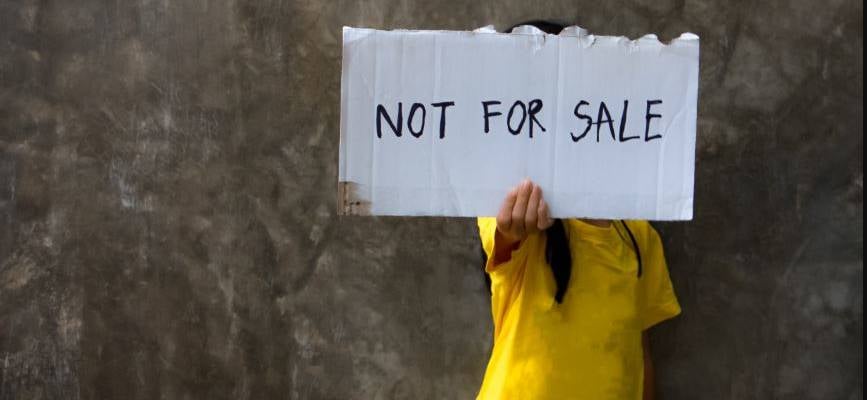Israel has once again proved that although the country is tiny in size, it packs a mighty punch in the fight for justice and rehabilitation of the victims of human trafficking.
By Rolene Marks, Lay of the Land
One of the lesser known facts about Israel is that this tiny country is leading the battle against international human trafficking. Many, I am sure, are wondering: How does Israel even feature in the same sentence as human trafficking? But in addition to the Jewish state’s many achievements is going from zero – to hero – in the fight against human trafficking.
In fact, Israel is considered a top tier country in this battle that is becoming more and more prevalent around the world.
Gender-based violence and women’s issues like parity, equality and suffrage are on the agendas of many countries. And so is the fight against the trafficking of women and children.
In the past, Israel had an abysmal record when it came to catching the pimps and purveyors of vulnerable men, women and children. In 2001, Israel was considered a Tier 3 country and not responsive to dealing with the issue at all. Women from Africa and Eastern Europe were easily smuggled through the Sinai Peninsula and sold into prostitution or cheap labour. Israel’s rating was so low that the country was on a par with Somalia and the Sudan.
This changed in 2001. The US State Department toughened its stance on global human trafficking and held back aid on the basis of each country’s record. The US State Department had put Israel on a blacklist because of the country’s dire record. Realising the veracity of this issue, Israel started the process of fighting the flesh trade.
Israel started the process that would result in the country becoming a leader in the fight against the human trafficking. The first order of business was giving police more jurisdictions over arresting perpetrators. Following this, an administrative body was set up at the Ministry of Justice which changed the way that victims were treated. Victims would no longer be treated as sex workers but as victims who deserve help.
n 2006, the Knesset, spearheaded by the Committee on the Status of Women, passed a law which would see offenders sentenced to 20 years for human trafficking violations. This was followed up in 2007 with further legislation in a campaign to end forced labour and an increased number in convictions for sex offenders.
Rehabilitation of Victims
What is the status for victims?
Israel started to give victims of human trafficking shelter, legal aid and protection assistance. In fact, it is the rehabilitation of victims that has contributed greatly to Israel’s record as the top tier country. A former head of the Knesset Committee on the Status of Women says, “When we formed our committee, I met with a government worker who worked with the trafficked women. It was a step by step process and we started out by going to speak to the women who had been rescued from the Sinai or Egypt and were in shelters or in a prison facility. Their stories were heartbreaking – many, including children and young boys have been sold into slavery and prostitution. Rape is a common occurrence for these victims. We took the media into these facilities and this really contributed in highlighting and bringing attention to their awful situation. The first law that was legislated was the creation of “no- man’s land”.
“Pressure was put on the government, judges and the police and as a result, Israel is now a country that leads the global fight against human trafficking,” she continues.
The remarkable strides that Israel has made in the fight against human trafficking has resulted in US State Department ranking the country as Tier 1.
In 2019, Israel topped the rankings for the eighth straight year, while Germany, Italy and Denmark lost theirs.
Some of the achievements that Israel has racked up include:
More shelters opened and the construction of a barrier constructed in 2013 between Egypt and Israel, has helped close a primary route for traffickers.
In February 2013, the Ha’aretz newspaper successfully sued the Tel Aviv District Court to reveal the name of a major sex trafficker who became a police informer.
The success of various government departments working together is also something that can be applied to other socio-economic areas within the state.
Policy of ‘Safe Return’
The most notable achievement is that Israel is the only country in the world to sponsor a year of rehabilitation for victims that have been trafficked, and this is paid for by the government. A comprehensive training programme that includes personnel from the police services, hospitals and health workers who take care of victims has been successfully implemented.
Government and NGO’s (non-governmental organizations) work in partnership and this has helped Israel become a first tier country. Israel has instituted a policy of “safe return” which entails skills training as well as physical and emotional therapy for victims. If a person is unable to return to their country of origin for whatever reason, Israel will grant asylum.
Every year, three awards are given out to individuals from NGOs, government or industry for excellence in the fight against human trafficking.
The selling of women into prostitution has virtually disappeared and it is illegal to advertise or distribute cards or pamphlets selling sex.
There is still so much to do to combat this international scourge. Israel can share how the successful models and legislation implemented help win the battle for the flesh trade.
